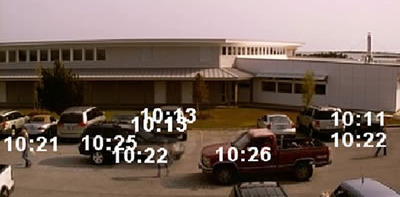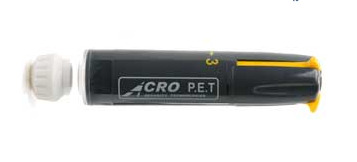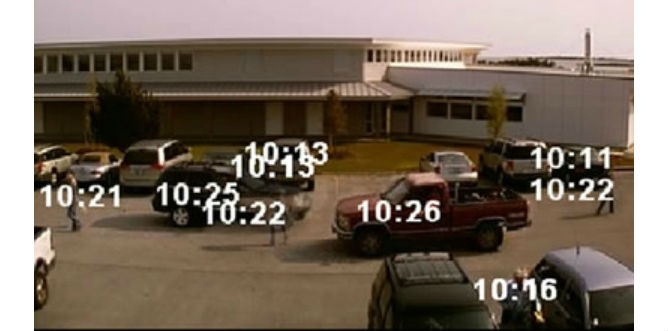Since the attempted terror attack on board a US airplane last Christmas day, airport authorities around the world are in a race to find novel solutions to fight terror. Israeli strategic and technical tactics feature high on their lists. What’s the secret to the country’s success in keeping Ben Gurion Airport terror free?
“Israel concentrates on the passengers and not their luggage so we have a real edge over the rest of the world in protecting travelers,” says Rafi Sela, a top security consultant and former chief security officer at the Israel Airport Authority. “This is in addition to us protecting the whole airport, while the others merely try to achieve aviation security,” he tells ISRAEL21c.
Sela, who advises governments and airport authorities all over the world, has become the leading figure advocating Israel’s unique approach to airport security in the past six years.
Through his company AR Challenges, he uses approaches and technology services rooted in Israeli innovation to try to help his clients stay one-step ahead of potential terrorists. The global transportation security consultancy, of which he is president, works with high profile clients including Canada’s RCMP, the US Navy Seals and airports around the world.
Making use of homegrown technologies, some of them developed by whiz-kids in the Israel Defense Forces (IDF) Intelligence Corps 8200 army unit, Sela believes that Israel’s strength in airport security is because it boasts near-invisible protective ‘rings’ of security around the airport and passengers.
Most airports around the world often lack measures as basic as video surveillance, he explains. “The airports are so concentrated on finding your bottles of water and perfumes that they don’t even look at you,” says Sela. “The security personnel forget that they are in the business of looking for terrorists.”
At Ben Gurion Airport you can take a coffee on board. According to Sela, airport security personnel don’t care what you take on the plane. “The security in Israel checks you as a passenger, and not the luggage. If you are cleared as a person then who cares what you bring on the plane with you?”
Here’s our list of Israel’s top 10 technologies to keep our airports safe.
1. Trace-Safe – An alternative to body scans
They’re in use in at least 19 airports in the US, but most people balk at the idea of a full body scan which essentially strips a passenger naked using radiation technology. Dangerous for the psyche and also for the frequent traveler who is exposed to numerous doses of radiation, an Israeli company working with a US partner could have the solution.
Trace-Safe from Israel and Raptor from the US have co-developed a chemical process, called TraceGuard, which can free particles from fabric and luggage for speedy detection and analysis.
The technology detects harmful substances and not benign ones like perfume or pharmaceuticals. It doesn’t show false alarms, doesn’t need filters or a cleaning. “You only want to detect the substances that you can make explosives or biological agents out of,” says Sela.
It can be integrated into scanners and magnetometers and also into a wand that can be passed over both people and luggage.
While Trace-Safe is struggling financially right now, Sela believes that TraceGuard has the potential to bring an end to the use of all other equipment at airports, including the detested body and shoe scanners. “I am among those experts who believe the full body scans are wrong and not healthy for people,” Sela tells ISRAEL21c. “Especially since they are passing through radiation; it defeats the cause.”
2. Suspect Detection System – Tracing the sweat of terror

Suspect Detection System (SDS) is an automated interrogation and background check technology for both travelers and airport employees. It’s like a polygraph machine for catching terrorists – an advanced and automated filtering tool that can identify potential suspects from among tens of thousands of people.
With human selectors and security personnel there is always the danger of introducing human error into the security check. But SDS’s VR-1000 has been built with the assumption that very sophisticated terrorists may not be on the wanted lists of Interpol police or Homeland Security.
The technology works like a lie detector to monitor the psychological and physiological fear of a terror suspect and to assuage Americans’ fears of being “profiled.” The test works like a robot, searching for cues that only terror suspects are likely to radiate.
3. BellSecure – Consolidating data
BellSecure is an Israeli security company that is so high up on the security chain that it’s impossible to locate its website. The new security platform, according to Sela, facilitates real time communication and alerts for both travelers and cargo. The start-up company developed by three Israeli entrepreneurs is now being promoted in both Israel and Canada.
Created by former soldiers in the highly prestigious 8200 IDF Intelligence Corp group, the platform provides the missing link between the identification and verification of people and cargo at the airport with local and worldwide authorities. With many systems in different countries, most of which are incompatible, the BellSecure solution can help to identity a secure and reliable no-fly list that derives data in real time from a multitude of sources.
Sela says that it manages security in a way that the $14 billion system bought by US security officials will never do. Currently looking for a pilot airport for a test run, BellSecure connects Homeland Security, Interpol data, pictures, voice and video to create a unified database that can be managed worldwide.
4. Eltel – Monitoring the monitors
Eltel, a subsidiary of Elul Group, provides logistics support to Israeli armed forces and government agencies. Eltel has developed a “smart” computerized training system that helps airport personnel deal swiftly and competently with security risks. This is a unified training system.
“This company owns a very unique competency program, which it can verify at the scanners as to how well a security person is performing,” explains Sela.
“You need to know they feel and how well they are doing when they are monitoring scans. This company provides a continuous competency check program. Nobody else in the world has it. Not only could it help tell managers when staff need a break to rest their eyes, it could create standards on how security personnel are managed and monitored,” he predicts.
The training system not only provides reports, but monitors those standards on a continuous basis.
5. WeCU – Here’s looking at you
WeCU aims to blend high-tech with psychology. It presents symbols and images that only certain terror operatives will “see.” Imagine suddenly seeing a picture of your mother projected on an airport wall. That’s the idea behind WeCU, which collects unusual responses to its images to trace and foil suspects.
While Sela likes the idea, he foresees that some governments, such as Canada’s, may take issue with this particular technology that smacks of ‘Big Brother.’ “This company has an algorithm that in some countries would be viewed as an invasion of privacy – Canada will never install it. I’ve told Canada that you can’t do security with political correctness. As long as you are doing it without a real plan, it will never work.”
If one could combine SDS with WeCU, this approach of profiling terrorists wouldn’t be so bluntly viewed as an invasion, suggests Sela.
6. Bust the security line with your own “Biometric VIP” card
Frequent flyers will be happy to know that these biometric cards being issued in Israel by the Airports Authority could make flights easier and safer the world over. No one wants to arrive hours before a flight and have to contend with unpredictable periods of waiting in line.
The biometric scanners are cards similar in size to credit cards that contain personal, biometric information about each traveler. Perhaps in the future they’ll be linked to international frequent flyer schemes. You’ll have to wait a little longer though, since for now they’re only being distributed to El Al’s business class passengers as a pilot test.
Although Sela likes the idea, he says this particular company would need a solution like BellSecure’s to authorize the check.
7. MagShoe – Keep your shoes on

While numerous Israeli airport security technologies in use around the world are undetectable to the naked eye, many American travelers are already familiar with MagShoe. Instead of the sometimes embarrassing and always inconvenient procedure of removing one’s shoes for airport security checks, the Israeli-made MagShoe lets travelers simply step up to be checked. The device needs only a few seconds to scan for concealed weapons.
If use of TraceGuard’s system becomes widespread, the MagShoe will become obsolete, says Sela. But MagShoe is still very effective for tracing objects hidden around the ankle area. Find it beside scanners and x-ray machines across America.
8. Vigilant – Sleeping with one eye open
Vigilant’s surveillance systems stay awake even if security personnel fall asleep. The Tel Aviv-based company, working with the Pelco company in California, has high-end installations already in place at various US locations including the George Bush Intercontinental Airport in Houston, Texas, and the Salt Lake City International Airport in Utah.
The intelligent digital monitoring system improves crime and terror prevention, not only in airports but also on American streets, like in Manhattan for example, one of dozens of locations that’s hooked up to Vigilant’s digital monitoring system. The company’s Video Surveillance Center is a fully digital management solution that provides a surveillance wall. It’s a turnkey solution for any surveillance center, airports included, that also includes a video motion detector.
9. Briefcam – Step back in time

This Israeli company provides a video synopsis technology that allows security personnel to quickly and effectively review and index surveillance footage. Briefcam helps to identify individuals at border crossings, at airports, or in and around power plants. Since fewer people are needed to review footage, the potential for human error is drastically reduced, as is the manpower needed to track events and uncover unusual occurrences.
While Sela likes this technology, he says airports going for video surveillance options might prefer the Canadian-Israeli company Visual Defense. Based on technology from the 8200 army unit, Visual Defense can watch thousands of cameras at the same time. It’s the only solution used in the subway in New York City in all underground stations. If airports decide to start using video surveillance, this would be the camera management company to use, Sela suggests.
10. ACRO-P.E.T. – Looks like a pen, sniffs out TATP

If the stewards on-board the recently foiled terror attack en route to Detroit had had this device, security ground personnel would have been better prepared for their task-at-hand, explains Prof. Ehud Keinan from the Technion – Israel Institute of Technology. In partnership with American researchers, the professor has developed a pen-like device that “sniffs” out TATP, a main component in explosive detonators, used in terror attacks in Israel, and a compound made famous by the shoe bomber.
Costing about $25 per “pen” and now sold through the Israeli company Acro Security, the ACRO-P.E.T. pen (Peroxide Explosives Tester) is one of a number of new chemical-based technologies that work to foil terrorists at airports, before they board an aircraft; and also to investigate suspicious cases and behavior while in flight.












